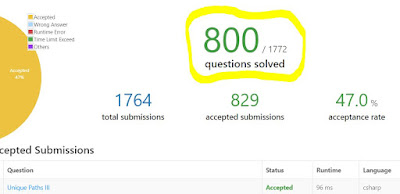A HARD problem to reach 800
Decided to pick a HARD problem as problem #800. Here it is: Unique Paths III - LeetCode
980. Unique Paths III
Hard
On a 2-dimensional grid, there are 4 types of squares:
1represents the starting square. There is exactly one starting square.2represents the ending square. There is exactly one ending square.0represents empty squares we can walk over.-1represents obstacles that we cannot walk over.
Return the number of 4-directional walks from the starting square to the ending square, that walk over every non-obstacle square exactly once.
Example 1:
Input: [[1,0,0,0],[0,0,0,0],[0,0,2,-1]] Output: 2 Explanation: We have the following two paths: 1. (0,0),(0,1),(0,2),(0,3),(1,3),(1,2),(1,1),(1,0),(2,0),(2,1),(2,2) 2. (0,0),(1,0),(2,0),(2,1),(1,1),(0,1),(0,2),(0,3),(1,3),(1,2),(2,2)
Example 2:
Input: [[1,0,0,0],[0,0,0,0],[0,0,0,2]] Output: 4 Explanation: We have the following four paths: 1. (0,0),(0,1),(0,2),(0,3),(1,3),(1,2),(1,1),(1,0),(2,0),(2,1),(2,2),(2,3) 2. (0,0),(0,1),(1,1),(1,0),(2,0),(2,1),(2,2),(1,2),(0,2),(0,3),(1,3),(2,3) 3. (0,0),(1,0),(2,0),(2,1),(2,2),(1,2),(1,1),(0,1),(0,2),(0,3),(1,3),(2,3) 4. (0,0),(1,0),(2,0),(2,1),(1,1),(0,1),(0,2),(0,3),(1,3),(1,2),(2,2),(2,3)
Example 3:
Input: [[0,1],[2,0]] Output: 0 Explanation: There is no path that walks over every empty square exactly once. Note that the starting and ending square can be anywhere in the grid.
Note:
1 <= grid.length * grid[0].length <= 20
Accepted
65,649
Submissions
85,157
Given the small limits, this then becomes a classic backtracking algorithm. Nothing else really to say, no gotchas or caveats, just standard backtracking. Cheers friends, ACC.
public int UniquePathsIII(int[][] grid)
{
int startRow = 0;
int startCol = 0;
int endRow = 0;
int endCol = 0;
int countNonObstacles = 0;
int countUniquePaths = 0;
int keyMultiplier = 0;
Hashtable visited = new Hashtable();
PreprocessGrid(grid, out startRow, out startCol, out endRow, out endCol, out countNonObstacles, out keyMultiplier);
int key = startRow * keyMultiplier + startCol;
visited.Add(key, true);
ClassicBacktracking(grid, startRow, startCol, endRow, endCol, countNonObstacles, visited, keyMultiplier, ref countUniquePaths);
return countUniquePaths;
}
private void ClassicBacktracking(int[][] grid,
int currentRow,
int currentCol,
int endRow,
int endCol,
int countNonObstacles,
Hashtable visited,
int keyMultiplier,
ref int countUniquePaths)
{
if (currentRow == endRow && currentCol == endCol)
{
if (visited.Count >= countNonObstacles) countUniquePaths++;
return;
}
int[] rowDelta = { 1, -1, 0, 0 };
int[] colDelta = { 0, 0, 1, -1 };
for (int i = 0; i < rowDelta.Length; i++)
{
int row = currentRow + rowDelta[i];
int col = currentCol + colDelta[i];
if (row >= 0 &&
row < grid.Length &&
col >= 0 &&
col < grid[row].Length &&
grid[row][col] != -1)
{
int key = row * keyMultiplier + col;
if (!visited.ContainsKey(key))
{
visited.Add(key, true);
ClassicBacktracking(grid, row, col, endRow, endCol, countNonObstacles, visited, keyMultiplier, ref countUniquePaths);
visited.Remove(key);
}
}
}
}
private void PreprocessGrid(int[][] grid,
out int startRow,
out int startCol,
out int endRow,
out int endCol,
out int countNonObstacles,
out int keyMultiplier)
{
startRow = -1;
startCol = -1;
endRow = -1;
endCol = -1;
countNonObstacles = 0;
keyMultiplier = Math.Max(grid.Length, grid[0].Length) + 1;
for (int r = 0; r < grid.Length; r++)
{
for (int c = 0; c < grid[r].Length; c++)
{
if (grid[r][c] == 1)
{
startRow = r;
startCol = c;
}
if (grid[r][c] == 2)
{
endRow = r;
endCol = c;
}
if (grid[r][c] != -1)
{
countNonObstacles++;
}
}
}
}




Comments
Post a Comment